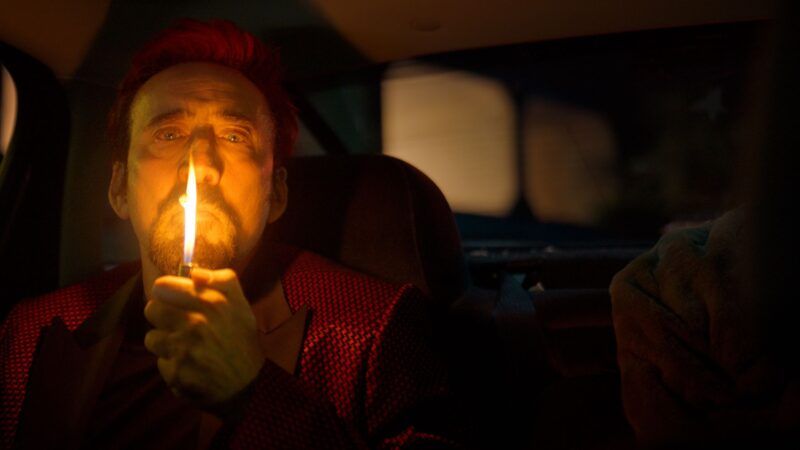Review: Sympathy for the Devil
Cage match.

Nicolas Cage, the noted madman actor, resident until recently in the Hollywood version of debtor's prison, is free at last. As he told GQ last year, the paycheck from his 2022 quasi-comeback movie, The Unbearable Weight of Massive Talent, enabled him to finally retire the multimillions of dollars of debt that he'd accumulated as a citizen of interest to the IRS and had kept him strapped to a Z-movie hamster wheel for more than a decade. Those were the years of Season of the Witch, Drive Angry, and Ghost Rider: Spirit of Vengeance—famously awful movies, especially considering the talent of the Oscar winner whose résumé they defaced. Now, having won back control of his career, Cage said he was determined not to screw it up again. "I'm just going to focus on being extremely selective," he told GQ. "I would like to make every movie as if it were my last."
Unfortunately, something seems to have gone wrong. Sympathy for the Devil, Cage's latest picture, isn't awful, exactly—not in the bold, nutty manner of Drive Angry or Bangkok Dangerous or any of his earlier misfires. Sympathy is worse, in a way—it's dull. Even with Cage decked out in an odd magenta-tinged hairpiece and what looks like a burgundy prom jacket, and giving forth with lines like, "Ever since I was a child, I've had a stuffy nose," the movie never comes alive. The story, with its cryptic structure and colorless dialogue, strives to tantalize (and indeed does have a twist), but for the most part it fends off our interest at every turn.
Joel Kinnaman (Rick Flag in the Suicide Squad movies) plays a character identified in the credits as The Driver. As the picture opens, we find him cruising anxiously through the off-the-Strip streets of Las Vegas, on his way to the hospital where his pain-wracked wife is about to give birth. Pulling into a parking garage, he's startled to suddenly find a stranger climbing into the back seat of his car, brandishing a pistol. This is The Passenger (Nic, of course), and he gets right down to business. "I'm your family emergency now," he says.
I'm not familiar with the film's Israeli director, Yuval Adler, or with its screenwriter, Luke Paradise, and I can't say I'm intent on getting better acquainted. Adler can't do a lot with a script that parks us claustrophobically in the car to observe these two characters as they cruise along, nattering about this and that and stopping only to shoot a cop or duck into a diner (where the story does open up for a bit). Another problem is Kinnaman, a recessive actor who's all but swallowed up by Cage's effortless charisma. (Who else would think to burst without warning into an unrequested rendition of the old disco hit "I Love the Nightlife"?)
As the story trundles along, we begin to realize that The Passenger is weirdly knowledgeable about The Driver—has been watching him, in fact. Now, he says, they're all going to go to Boulder City, outside of Vegas, where The Passenger's mother is dying of cancer—and where "a very important man is waiting for our arrival, waiting for you," he tells The Driver. Jesus, what could that mean? "People always say, 'Don't assume the worst,'" The Passenger observes. "Why? Sometimes the worst is what you should assume."


Show Comments (8)